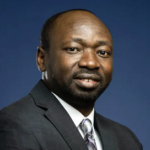About A Tapestry of Global Christology
An interview with Isuwa Atsen
EV: What led you to write this book? What problem or issue(s) are you seeking to address?
IA: This book is actually my revised doctoral dissertation written under the supervision of Kevin J. Vanhoozer. I wrote it to address a particular trend in global Christology (theology in general) that tends to prioritize context over scripture or puts the two on the same level of significance for theological work. This approach often produces theological constructions that read Christian scripture in a nontheological way and produce Christologies that are inconsistent on some critical point with the Christology of historical Christianity. As a safeguard against this trend, the book proposes the deployment and interaction of certain hermeneutical approaches for doing global Christology, which include the theological interpretation of Scripture, analytic theology, and contextual theology
EV: What is the thesis of your book?
IA: The book argues that a truly global understanding of Christ would take scripture seriously and use it in sync with the early Christian tradition encapsulated in the creeds (e.g. Nicaea and Chalcedon), while also employing contextual realities and/or resources with the help of analytic tools to portray the very same Christ of Scripture and of the Christian tradition with precision, clarity, and consistency.
EV: Who’s your target audience, and what are you most hoping they hear from it?
IA: My target audience is the global theological community, particularly those who are engaged in the work of constructive theology from and for the Majority World. I hope that from this book, both students and practitioners will appreciate the fact that our contextual Christological constructions must never be at liberty to deviate from the Christ of scripture and the great Christian tradition.
EV: Did you have any “aha” moments while writing the book?
IA: Quite a few. But the biggest one for me was learning about the non-Western influences that shaped Western culture and civilization. This clearly problematizes the claim of cultural independence (also, superiority or inferiority), which has a significant implication for global theological reflection. It means that theological constructions in non-Western contexts should be free to draw helpful insights from outside our cultures without thinking that we are using something foreign. While culture remains an important resource for theological reflection, limiting one’s theological thinking to one’s own culture leads to cultural imprisonment, and this only makes the global theologian to see less rather than more.
EV: What was the most challenging part of the book to write?
IA: Writing chapter two, which dwells on the use of scripture in theology, was the most challenging for me, but it was also the most rewarding. The chapter required me to rehash the history of biblical interpretation as well as relate the story to the use of scripture in doing theology. It forced me to read far and wide, which then helped me to grow in theological depths and heights that I had not reached before.
EV: What kind of seminary/church classes should assign your book?
IA: Classes on Christology, theological methodology, global theology, the interpretation of scripture (ch. 2), and analytic theology (ch. 3).
About the Author

Isuwa Atsen (PhD, Trinity Evangelical Divinity School) is Assistant Professor of Theology at Trinity Christian College.

